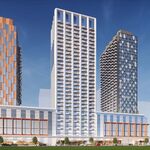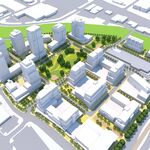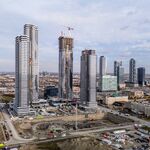Midtown Urbanist
Superstar
Yeah I can agree with that... but....Being larger also means that average commute distances are also longer which means every additional or redundant stop will cause problems. As I said previously, due to the LSE line running parallel to this LRT perhaps the issue is much smaller (assuming we get Fare Integration), but in general there is a massive risk when it comes to having tighter stop spacing especially in suburbs. You can easily get away with 1km long stop spacing in suburbs, we shouldn't be afraid to stretch stop spacing as much as possible in order to shorten commutes and make the line more attractive to use.
Is this truly the suburbs?
The Eglinton East and Kingston corridors seem pretty dense and main-street oriented already, and the surrounding residential areas are more akin to inner city neighbourhoods in built form and street layout than North Scarborough suburbia. The surrounding context will only be trending in an urban direction with all the infill intensification that would come with an LRT.






